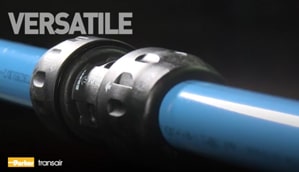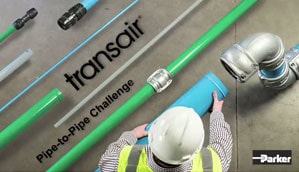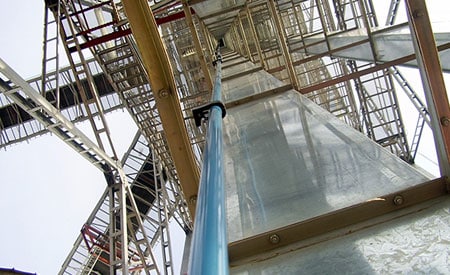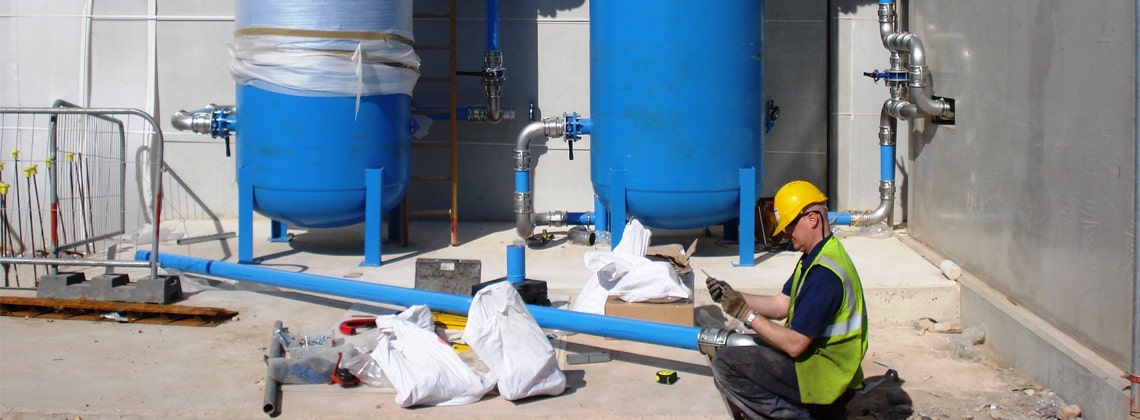Frequently Asked Questions

Transair aluminum and stainless steel piping systems are the ideal choice for compressed air piping systems. Transair can also be used for vacuum, inert gas, process water, and chemical transfer piping systems. Our 20+ years of experience in the industry has made us the authority for compressed air piping. Browse our frequently asked questions section to learn more about Transair. We offer articles covering installation techniques, compressed air system products, Transair technical features, and common applications.
Case Studies

Transair aluminum and stainless steel piping systems have been used globally for compressed air piping systems for over 20 years. During that time, Transair has been installed in over 750,000 facilities. From local automotive repair shops to global food and beverage factories, Transair has been used due to our fast, easy, and leak free components. Read our case studies to see how Transair helped solve the issues these manufacturers encountered with their piping systems.
Transair System Overview

With over 750,000 global installations and 20+ years of product innovation, Transair has become the trusted brand for aluminum compressed air piping. Transair aluminum is not only for compressed air, Transair can also be used for vacuum and industrial / inert gas applications. The "full-bore" design of Transair means you do not need to sacrifice ease of installation for performance. Watch this video to learn more about our aluminum pipe offering.
PIPE-TO-PIPE CHALLENGE

Transair aluminum pipe can be installed up to 4x faster than traditional copper or carbon steel piping. Transair piping for compressed air, vacuum, and industrial / inert gas does not require any threading, soldering, or gluing to make a leak-free connection. Watch this video to witness the ease and simplicity of installing Transair aluminum piping for your next compressed air system.
Disadvantages of Traditional Compressed Air Piping
The compressed air piping industry has long been dominated by traditional materials including steel, stainless steel, copper, and black iron. While these types are very familiar and widely used, they present a number of disadvantages:
Copper
- Labor intensive
- Danger from flames and fumes when welding
- Air leaks
Steel
- Special tools required
- Required experienced labor
- Susceptible to corrosion
- High-pressure drop/air leaks
Stainless Steel
- Bulky and heavy tools
- Weight of larger pipes
- Non-versatile system
Black Iron
- Very heavy and difficult to install
- Susceptible to corrosion and air leaks
- Experienced fitters only
- Difficult to modify
- Costly to repair
Advantages of Aluminum Compressed Air Piping
Compressed air distribution piping is the means for transporting compressed air and linking the compressor room (supply & storage) to the point of use. Furthermore, proper generation and usage of compressed air represents one of the largest opportunities for immediate energy savings. A properly designed compressed air system typically saves a plant 20 to 50% of its electric bill, sometimes even up to 60% within 24 months.
In recent years, aluminum compressed air piping systems have risen in popularity, particularly due to several factors:
• Modularity
• Quick Installation
• Aestheticism
Aluminum also has a low friction coefficient, providing the best possible laminar flow. Full-bore fittings further minimize pressure drop for optimum flow and energy efficiency. Leak-free connectors prevent air loss and wasted energy.
Aluminum is ideal for installations requiring the highest quality air. Aluminum material will not rust or corrode, and has no rough surfaces or interior restrictions that accumulate contaminants. The smooth interior with full-bore design allows air to flow to your dryers and filters for efficient removal ensuring higher longevity of equipment.
Sustainability
 Parker focuses on providing sustainable solutions at every stage – from research and development, product manufacturing, system installation and efficient operations through the life of a building – for the people, planet and increased profits.
Parker focuses on providing sustainable solutions at every stage – from research and development, product manufacturing, system installation and efficient operations through the life of a building – for the people, planet and increased profits.
No Flames, No Fumes: Our no-flame connection method allows for faster installation and safer environments by reducing hazardous and noxious fumes and reducing overall man-hours on a project.
Improved Air Quality: Transair reduces the emissions of Particulate Matter on the job site.
Zero Incremental Electrical Energy: There’s no need for electricity and no draw on the power grid. Welding or soldering can use up to 2,000 watts per hour on a four-inch joint.
Decreased Carbon Footprint: In a life cycle analysis, the use of a six-inch Transair aluminum pipe system is five times less harmful to the environment than a traditional steel pipe system.
Industry Applications
Dust and outdoor installations rapidly accelerate the deterioration of compressed air systems. To combat these elements, all Transair pipe is specifically coated with a Qualicoat certified powder-coating to enhance its mechanical, physical, and chemical properties, making it ideal for the most aggressive industrial applications. Parker Transair is also certified ISO 9001 version 2015 and operates a Quality Management System in order to ensure the level of quality and service our customers expect in a wide range of industries.
Parker Hannifin has successfully installed Transair compressed air piping systems for a number of industries, including:
• Military
• Marine/Shipbuilding
• Energy/Power industry
• Textile
• Semiconductor
• Aerospace
• Automotive
• Wood working
• Rail metal fabrication
• Food and beverage
• Pharmaceutical
• Chemical
• Mining
• Paper and pulp
• Printing
• Biomedical
• Waste water treatment
• Electronics
• Agriculture
• And many others!

Thanks to its large selection of diameters from ½" (16.5 mm) to 8" (220 mm) and an extensive range of accessories, Transair aluminum and stainless steel piping system meets the requirements of numerous industrial and garage workshop installations. Furthermore, the simple installation, energy savings, and flexible modular design of Transair makes it the most efficient piping solution available.
Application: Compressed Air

Compressed air users have been burdened by the limitations of traditional compressed air pipe systems. Difficult installation and modification, poor air quality, and high-pressure losses are all common problems with copper, steel, and black iron systems. Transair solves these problems with its innovative design making installation fast, simple, and economical.
Transair offers significant savings on installation, maintenance and operating costs when compared to the traditional compressed air piping materials. It is lightweight, strong, and resistant to corrosion, which ensures extended longevity of equipment and can help to avoid frequent changes of filter elements. Its removable and interchangeable components allow users to easily reconfigure production layouts or implement process changes within minutes.
The versatility of Transair's quick connections also eliminates the need to thread, solder or glue pipe. Our "full bore" components and the low friction coefficient of aluminum pipe ensures optimal and constant flow throughout your compressed air system, and its unique sealing technology guarantees Transair to be leak-free.
Transair is an environmentally sustainable and responsible product that reduces the carbon footprint by 80% over steel piping installations. The materials used to produce Transair pipe and fittings are 100% recyclable and guaranteed silicone-free. Transair is also ideal for aggressive environments, with a specifically powder-coated outer surface that enhances mechanical, physical, and chemical properties.
By installing Transair, industrial facilities can increase efficiency, reduce pressure drops, and eliminate leaks while improving operational efficiencies and minimizing installation and maintenance costs. Transair can be integrated into existing copper and steel compressed air piping systems without compromising performance, making it perfect for upgrades or expansion projects.
Application: Vacuum

Vacuum pumps are necessary elements in any workshop, but can be an unwanted source of heat and noise on the shop floor. Installing a centralized vacuum system will improve working conditions in the plant, and because pump maintenance can be performed without stopping workshop machinery, the system will increase overall productivity.
Transair's quick-connect piping system can be used for vacuum systems down to 99.9% (0.03" Hg / 1mbar) and offers a high-quality vacuum solution that will increase the life expectancy of your equipment and the durability of your products. Our aluminum pipe is naturally resistant to corrosion and the unique quick-connect interlocking components guarantee a leak-free connection, ensuring optimal airflow and reduced maintenance costs for your system.
Transair's modular and reusable system is easy to setup and adjust, safe, durable, and requires just half the time to install compared to PVC piping systems that are traditionally used for centralized vacuum systems. All products are developed to be maintenance-free, and are stocked and available in gray for easy identification among your other piping systems.
Application: Inert Gas

Transair conveys nitrogen for a number of uses, including:
• As a blanketing gas to prevent fire and explosions
• To protect products from degradation by replacing atmospheric oxygen
• To treat molten metal manufacturing
• To avoid oxidation during the heat treatment of metallic products, and during
welding and laser cutting
• In garages – filling tires to increase their longevity
Transair piping systems are uniquely designed for optimum performance while using inert gases. The smooth interior with "full bore" design allows the gas to flow free without compromising its properties. Transair is suitable for the distribution of Argon, Nitrogen, CO2 mixtures, Helium and many mixed specialty gases for up to 232 psi in temperatures from -4°F to 140°F.
Regarding the safety aspect of Transair, the polyamide with fiberglass and treated-brass constructed connectors are non-flammable with no propagation of flame. Furthermore, Transair has Qualicoat certification that is a guarantee of the quality of the lacquer finish applied to Transair aluminum pipe, which enhances mechanical, physical and chemical properties.






